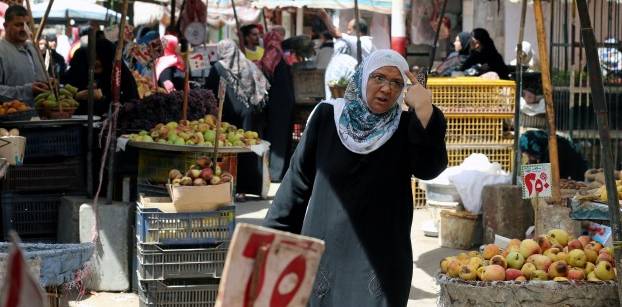Egypt's exports increase by 7 pct in May amid dollar shortage

Egyptians shop at a vegetable market in Cairo, Egypt, June 15, 2016. Picture taken June 15, 2016. REUTERS/Mohamed Abd El Ghany
CAIRO, Jun 28 (Aswat Masriya) – Egypt’s exports increased by 7 per cent in May compared to the same month last year, the Egyptian trade minister said on Tuesday, as the country’s cash-strapped economy continues to face a foreign currency shortage.
Exports, a source of foreign currency, stood at $1.9 billion in May compared to $1.7 billion in the same month last year, Minister of Trade and Industry Tarek Kabil said in a statement.
This year alone saw an $8.4 billion climb in exports, from January through the end of May, marking an improvement from last year when the value of exports dropped by 16.4 per cent, Kabil added.
Construction equipment exports have been key to this year’s increase, with their value reaching $489 in May compared to $302 in the same month last year, registering a 62 per cent surge.
Agricultural exports also jumped by 16 per cent to reach $273 million, having stood at $235 million in May last year.
On the other hand, Egypt’s imports fell by 19 per cent. The value of imports in the first four months of 2016 totalled $18 billion, compared to $22.5 in the same period last year.
“These indicators confirm the success of the ministry’s plan to increase exports, curb the chaos in imports, increase the reliance on local products and reduce the pressure on foreign currency.”
Egypt is a net importer, but has taken a number of measures lately to narrow its trade deficit. The state-run statistics agency said in a statement earlier this month that the deficit fell by 44 per cent to reach $2.2 billion in March 2016 compared to $4 billion in the same month in 2015.
Faced with a dire shortage in forex reserves, the Egyptian government imposed new rules in late 2015 to curtail what it saw as unregulated imports, requiring importers to register the original manufacturers of imported products, obtain imports’ documents directly from foreign banks and lodge a 100 per cent cash margin on import letters of credit.
At the end of January 2016, the government announced that it raised tariff rates on a range of products, another measure aimed at reducing the country's import bill.
The 2011 Uprising that toppled long-serving president Hosni Mubarak set off years of political turmoil, which have taken a toll on the Egyptian economy, driving away tourists and foreign investors. The country’s foreign reserves have been halved from $36 billion before January 2011 to $17 billion at the end of April 2016.









facebook comments